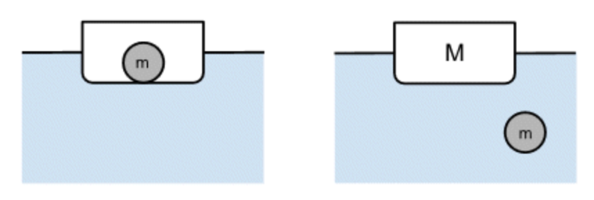
The mass of the boat is M and the mass of the rock is m. The density of water is ρ_w and the density of the rock is ρ_r.
When the rock is in the bock, Archimede’s Principle is the following case:
V_{d1} = \frac{(M + m)}{ρ_w}
When the rock is at the bottom of the lake, Archimede’s Principle gives us this case:
V_{d2} = \frac{M}{ρ_w} + \frac{m}{ρ_r}
If you take the difference of the two, you get:
V_{d1} - V_{d2} = \frac{m}{ρ_w} - \frac{m}{ρ_r}
The density of the rock is greater than the density of the water, making the above equation positive. This means that more water is displaced with V_{d1}. The water level falls when the rock is thrown overboard.
1 Like